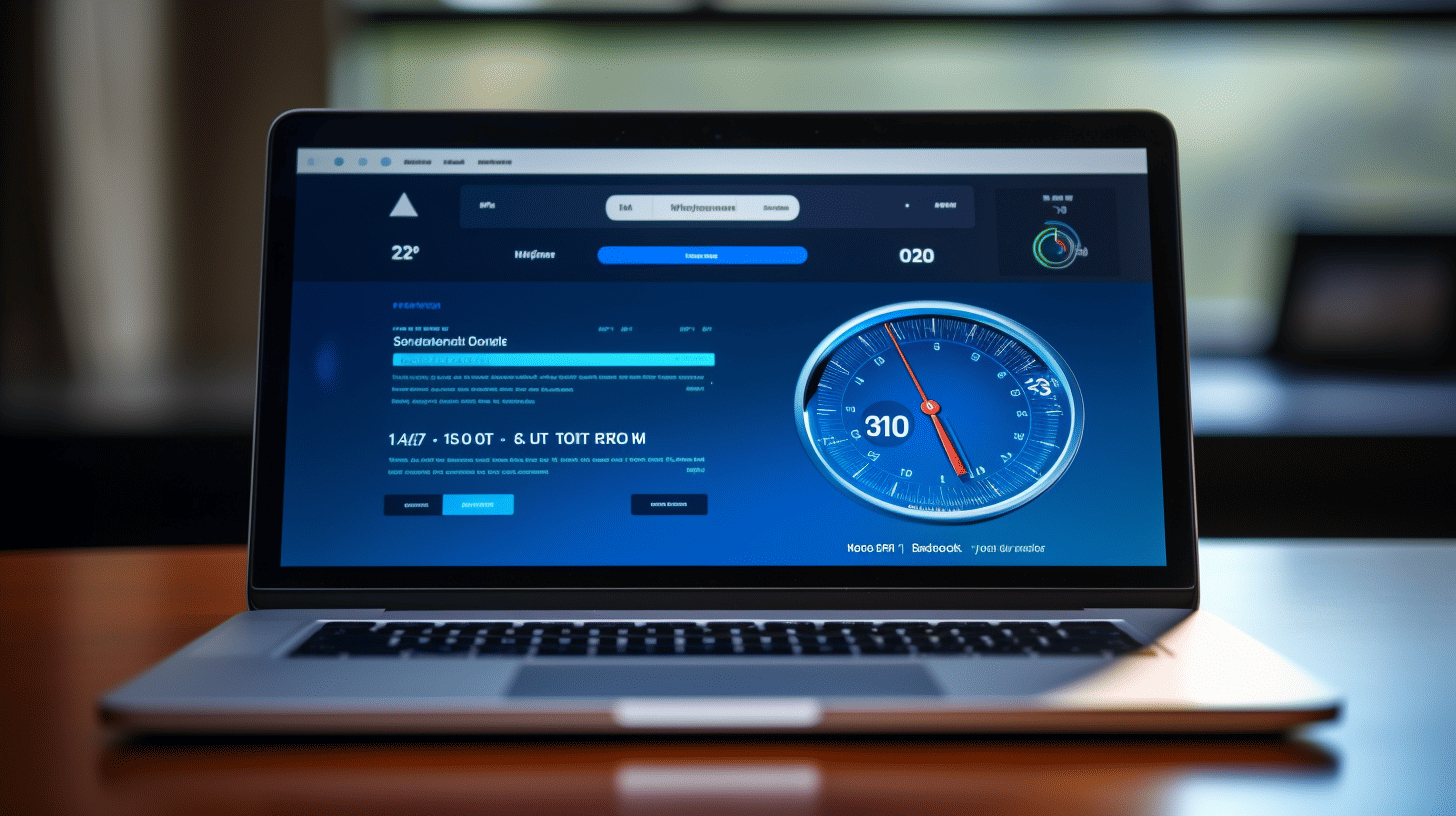在当今快节奏的数字世界中,每一秒都至关重要。用户希望网站能够快速无缝地加载。加载缓慢的网站会让访问者感到沮丧,并导致负面的用户体验。研究表明,网站速度在用户满意度中起着至关重要的作用,并且会影响转化率和跳出率等重要指标。
对于 WordPress 网站,优化速度对于为用户提供流畅高效的体验至关重要。加载缓慢的 WordPress 网站会阻碍您的在线形象并对您的业务成果产生负面影响。不过,好消息是,有一些行之有效的技术和策略可以加速 WordPress 网站并提高其性能。
在本文中,我们将探讨网站速度的重要性、加载时间对关键指标的影响,并深入研究加速 WordPress 网站的具体技术。无论您是企业主、开发人员还是 WordPress 爱好者,本文都将提供有价值的见解和可操作的提示,帮助您充分发挥 WordPress 网站的潜力。
因此,请系好安全带,我们将踏上提升速度和优化您的 WordPress 网站性能的旅程!
网站速度的重要性
说到成功运营一个网站,有一个关键因素可以决定你的在线形象,那就是网站速度。在当今快节奏的数字世界中,用户变得越来越没有耐心,希望网站能够立即加载。如果您的网站加载时间过长,您可能会失去潜在客户并损害您的转化率。但网站速度到底有多重要?它对用户体验和转化率有何影响?让我们深入探讨一下。
网站平均加载时间
根据最近的数据,2023 年网站的平均加载时间在桌面设备上约为 2.5 秒,在移动设备上则稍长一些,为 8.6 秒。这些数字可能看起来相对较短,但就网站加载时间而言,每一秒都至关重要。研究表明,即使页面加载时间延迟一秒,也会导致客户满意度和参与度大幅下降。
转换率和加载速度
网站速度不仅会影响用户体验,还会直接影响您的转化率。研究表明,加载时间较快(约一秒)的网站的转化率为 39%。另一方面,加载时间较慢的网站的转化率较低。这表明,如果网站加载时间过长,用户更有可能放弃该网站,从而错失转化机会并造成潜在的收入损失。
用户对加载速度的期望
除了影响转化率之外,网站速度也很重要,因为它直接影响用户的期望。随着技术的不断进步,用户已经习惯了更快、更高效的在线体验。据统计,高达 64% 的智能手机用户希望网页在四秒或更短的时间内加载。如果超过这个时间,您就有让访客感到沮丧并赶走他们的风险。
为了确保您的网站满足这些期望并提供最佳的用户体验,必须优先考虑网站速度优化。通过采取措施减少页面加载时间,您可以提高用户满意度,提高转化率,并最终提高您的整体在线成功率。
准备好提升网站加载速度了吗?查看我们的综合指南 加快网站加载速度 学习优化网站性能的有效策略和技巧。
网站加载时间的影响
在当今快节奏的数字世界中,即时满足是常态,网站加载时间在决定网站成败方面起着至关重要的作用。加载缓慢的网站可能会导致用户感到沮丧、转化率降低,潜在客户会跳转到竞争对手的网站。另一方面,加载速度快的网站可以增强整体用户体验、提高参与度,并增加用户购买或采取所需行动的可能性。
⚡ 性能和转化率
影响网站加载时间的关键因素之一是 转化率研究表明,即使页面加载时间稍微延迟,也会对转化率产生重大影响。根据行业研究,网站加载时间每增加一秒,前五秒内的转化率平均下降 4.42%[1]。这意味着,对于一个每天收入 $100,000 的电子商务网站来说,加载时间延迟一秒钟就可能给企业造成每年 $2.5 万美元的销售损失[1].
⚡ 跳出率和页面速度
网站加载时间也与 跳出率 – 浏览一页后离开网站的访客百分比。研究表明,网站加载时间延迟一秒,跳出率就会增加惊人的 32%[1]。这意味着,如果您的网站加载时间过长,用户更有可能在浏览其内容或产品之前就放弃它。第一印象很重要,加载时间过长可能会将潜在客户推向竞争对手的怀抱。
⚡ 页面速度和购买决策
网站加载时间不仅影响跳出率和转化率,还会影响客户的 购买决策一项研究显示,近 70% 的消费者承认网页速度影响他们在网站上购物的意愿[1]。如果您的网站加载时间过长,潜在客户可能会选择离开,因为他们担心如果网站无法快速加载,可能无法提供流畅可靠的购物体验。在当今竞争激烈的在线市场中,只需点击一下即可获得无数选择,提供快速无缝的浏览体验对于赢得消费者的信任和信心至关重要。
对于希望在数字领域取得成功的企业来说,缩短网站加载时间应该是首要任务。通过优化网站性能和缩短加载时间,您可以增强用户体验、提高参与度并提高转化率。在接下来的部分中,我们将探讨可行的策略和最佳实践来缩短网站加载时间,为您提供提升网站性能和给访问者留下持久印象所需的知识。敬请期待!
你知道吗?网站加载时间延迟一秒钟可能会使跳出率增加 32%[1].
[1]: 来源:Kissmetrics
加速 WordPress 网站的有效技术
在当今快节奏的世界里,网站速度是成功的关键。加载缓慢的网站不仅会让用户感到沮丧,还会降低搜索引擎排名。作为 WordPress 网站所有者,您需要确保您的网站针对速度进行了优化,以便为访问者提供无缝的浏览体验。
以下是一些加速 WordPress 网站的有效技术,可帮助您提高性能、吸引用户并提升您的 SEO 排名。
图像优化
拖慢 WordPress 网站速度的主要原因之一是未优化的大型图像。高分辨率图像会严重影响页面加载时间,尤其是对于网络连接较慢或移动设备较慢的用户。
为了加快网站加载时间,图像优化是必不可少的。 通过压缩和调整图像大小而不牺牲质量,您可以 减小文件大小 同时仍保持您的网站的视觉吸引力。
考虑实施这些图像优化技术:
- 使用适当的图像尺寸: 调整图像大小以适应网页所需的精确尺寸。这可以防止浏览器浪费资源来动态调整图像大小。
- 压缩图像: 使用图像压缩工具或 WordPress 插件,在不影响质量的情况下减小图像文件大小,例如 斯马什.
- 利用延迟加载: 延迟加载会延迟图像的加载,直到用户即将查看它们,从而减少初始页面加载时间。
启用缓存
缓存是一种帮助存储网站静态版本的技术,可让后续页面加载速度更快。通过启用缓存,您可以 减少服务器响应时间 并最大限度地减少需要传输的数据量,从而加快页面加载时间。
以下是您可以实现的几种缓存方法:
- 浏览器缓存: 指示访问者的浏览器存储 CSS、JavaScript 和图像等静态资源,这样在后续访问时无需重新加载。
- 服务器端缓存: 利用服务器端缓存机制(例如Memcached或Redis)来存储生成的HTML页面并减少每个请求所需的处理时间。
- WordPress 缓存插件: 使用流行的插件,例如 W3 总缓存 或者 WP超级缓存 轻松在您的 WordPress 网站上启用缓存。
压缩 CSS 和 JavaScript
过多的 CSS 和 JavaScript 文件会增加对服务器的请求数量,从而降低网站速度。压缩这些文件包括删除不必要的字符(例如空格和注释),以及将多个文件合并为一个, 减少文件总大小.
通过压缩 CSS 和 JavaScript,您将受益于:
- 更快的下载时间: 减小文件大小意味着您的网站访问者可以下载得更快。
- 更少的 HTTP 请求: 将多个 CSS 和 JavaScript 文件合并为一个可减少对服务器的请求数量。
使用内容分发网络 (CDN)
内容分发网络 (CDN) 是地理分布的全球服务器网络。通过在这些服务器上缓存您网站的静态资产,CDN 可以从最靠近用户的服务器分发内容,从而减少数据传输距离并提高网站性能。
实施 CDN 有几个优点:
- 减少延迟: 内容从最近的服务器传送,从而最大限度地减少加载网站所需的时间。
- 提高可扩展性: 通过将静态内容卸载到 CDN,您的服务器可以处理更多请求,从而提高整体可扩展性。
- 增强的安全性: CDN 通常会提供额外的安全层,例如 DDoS 保护和 Web 应用程序防火墙。
字体优化
字体在网站的整体设计和美观性方面起着重要作用。但是,使用过多或过大的字体文件会降低 WordPress 网站的速度。字体优化对于提高网站速度而不损害视觉吸引力至关重要。
考虑以下字体优化技术:
- 限制字体使用: 坚持使用几种字体,避免在单个页面上使用多种字体样式。
- 使用网络安全字体: 大多数设备都预安装了 Web 安全字体,减少了加载额外字体文件的需要。
- 异步加载字体: 通过异步加载字体文件,您的网站在等待字体加载时不会被阻止呈现。
优化图像、启用缓存、缩小 CSS 和 JavaScript、使用内容分发网络 (CDN) 和字体优化只是加速 WordPress 网站的一些有效技术。通过实施这些策略,您将提供更好的用户体验、提高 SEO 排名并增加访客参与度。
要了解有关增强 WordPress 网站性能的更多信息,请查看此综合指南 增强 WordPress 网站性能.
WordPress 特定的速度改进
您的 WordPress 网站加载时间太长了吗?别担心,我们会帮您解决!在本文中,我们将探讨一些可以对 WordPress 网站进行的具体速度改进。通过实施这些策略,您将确保网站加载速度快,从而让访问者保持参与度和满意度。
选择合适的托管
说到网站速度,选择合适的托管服务提供商至关重要。以下是为您的 WordPress 网站选择托管服务时需要考虑的一些关键因素:
- 表现:寻找提供针对 WordPress 优化的高性能服务器的托管服务提供商。这可确保您的网站快速高效地加载。
- 可靠性:选择可靠的托管服务,保证停机时间最短。毕竟,如果网站经常无法访问,那么速度再快又有什么用呢?
- 可扩展性:随着网站的发展,您需要一个能够容纳增加的流量而不会牺牲性能的托管提供商。确保他们提供可扩展的托管计划,以满足您未来的需求。
- 安全:安全的托管环境对于保护您的网站免受网络威胁至关重要。选择提供强大安全措施(如防火墙、SSL 证书和定期备份)的提供商。
通过选择正确的托管服务提供商,您将为快速的 WordPress 网站奠定坚实的基础。
使用缓存插件
缓存插件可以大大提高 WordPress 网站的速度。这些插件会生成静态 HTML 文件并将其提供给访问者,无需为每个页面请求生成动态内容。以下是您应该考虑使用缓存插件的原因:
- 更快的页面加载时间:通过缓存静态 HTML 文件,您的网站对于新访客和回访者的加载速度都会显著加快。
- 提高服务器性能:缓存通过提供缓存文件而不是处理资源密集型的 PHP 脚本和数据库查询来减少服务器的工作负载。
- 更好的用户体验:快速的网站会让访客感到满意,并让他们保持活跃。他们更有可能停留更长时间,浏览更多页面,并转变为忠实客户。
WordPress 有多种出色的缓存插件。一些流行的选项包括 WP Rocket、W3 Total Cache 和 WP Super Cache。花点时间探索这些插件,然后选择最适合您网站需求的插件。
数据库优化
WordPress 使用数据库来存储您网站的所有内容,例如帖子、页面和设置。随着时间的推移,此数据库可能会因不必要的数据而变得臃肿,从而减慢您的网站速度。以下是优化 WordPress 数据库以实现最大速度的方法:
- 删除不必要的插件和主题:停用并删除 WordPress 安装中所有未使用的插件和主题。它们会占用数据库空间,并可能降低网站速度。
- 清理数据库:使用 WP-Optimize 或 WP-Sweep 等插件删除不必要的数据,例如帖子修订、垃圾评论和瞬态数据。这些插件还可以优化数据库表以获得更好的性能。
- 优化图像:大型图像文件会严重降低网站速度。使用 Smush 或 EWWW Image Optimizer 等图像优化插件来压缩和调整图像大小,而不会降低质量。
实施这些数据库优化技术将有助于简化您的 WordPress 网站并提高其整体速度和性能。
请记住,良好的网站托管、缓存插件和数据库优化对于提高 WordPress 网站速度至关重要。通过遵循这些提示,您将能够为访问者提供闪电般的网站体验。
那么,还等什么?立即开始实施这些速度改进,并观察您的 WordPress 网站在性能和用户满意度方面飙升至新高度!🚀
结论
总之,提高 WordPress 网站的速度对于成功的在线形象至关重要。网站加载时间对转化率、跳出率和用户期望等各个方面的影响不容忽视。通过实施图像优化、启用缓存、最小化 CSS 和 JavaScript、使用 CDN 和字体优化等经过验证的技术,您可以显著提高 WordPress 网站的速度和性能。
特定的 WordPress 速度改进,例如选择正确的托管、使用缓存插件和优化数据库,可以进一步促进网站更快、更高效。
Managed-WP 是一个高级托管 WordPress 云托管平台,可帮助简化您的网站基础架构并确保最佳速度和性能。凭借其解决问题的专业知识和 24/7/365 全天候支持,Managed-WP 是提高您的 WordPress 网站速度和整体功能的完美合作伙伴。
立即开始使用 Managed-WP 释放 WordPress 网站的全部潜力。访问其网站 managed-wp.com 探索他们的服务并将您的数字体验提升到新的高度。
常见问题
- 有哪些行之有效的技术可以加速 WordPress 网站?
一些加速 WordPress 网站的成熟技术包括:优化图像、使用缓存插件、缩小和合并 CSS 和 JS 文件、利用内容分发网络 (CDN)、启用 GZIP 压缩以及选择快速可靠的托管服务提供商。
- 为什么网站速度对于 WordPress 网站很重要?
网站速度对于 WordPress 网站来说非常重要,因为它直接影响用户体验、搜索引擎排名和转化率。加载缓慢的网站会导致更高的跳出率,并阻止访问者与您的内容互动或进行购买。
- 如何优化我的 WordPress 网站上的图像以获得更好的性能?
为了优化 WordPress 网站上的图片,您可以将图片调整为适当的尺寸,使用 Photoshop 或插件等工具对图片进行压缩而不会造成显著的质量损失,并利用延迟加载仅在用户可见时加载图片。
- 什么是缓存插件以及它们如何帮助加快 WordPress 网站的速度?
缓存插件会创建动态 WordPress 页面的静态 HTML 版本并将其提供给访问者,从而减少每次请求时从头生成页面的需要。这有助于加快网站加载时间并减少服务器负载。
- 我需要技术技能来在 WordPress 中实施网站速度优化技术吗?
虽然某些网站速度优化技术可能需要技术技能,但许多技术可以使用插件和用户友好型工具来实现。但是,建议掌握 WordPress 和网站优化的基本知识,以确保正确实施和故障排除。



















